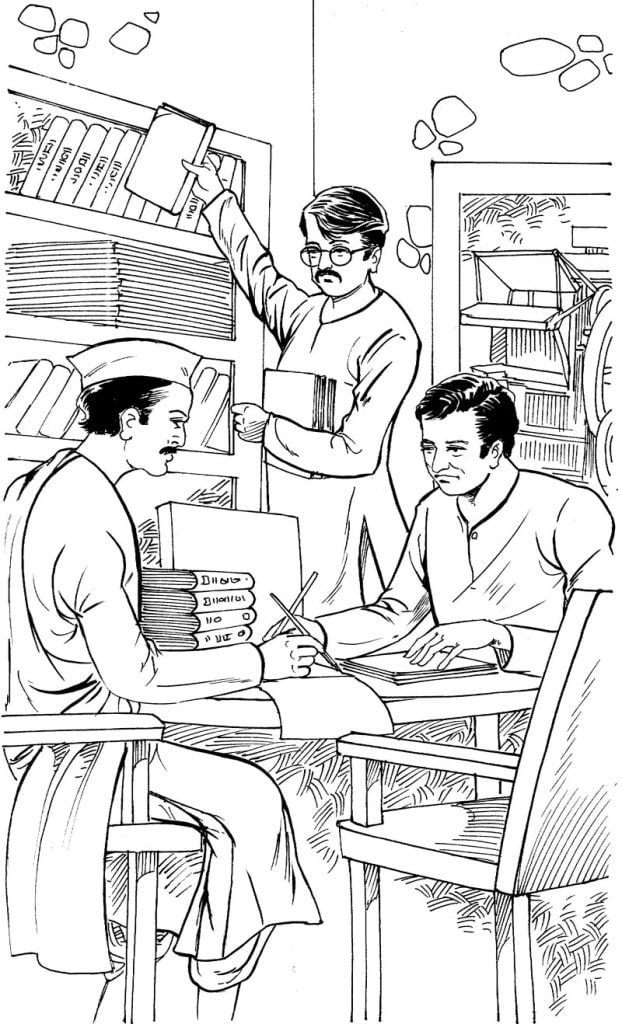It was in November, 1909 that Vidyarthi had resigned from the Currency Office. Now he was jobless and the question was what to do to keep the body and soul together.
He had a wife to think of as well.
The piece of the newspaper that caused the losing of his job drew his attention. The fiery article he happened to read gave the impression that the newspaper should be a patriotic and revolutionary one.
The idea of going to the newspaper to seek a job flashed through his mind. There was no harm in trying. After all his mind was also full of revolutionary ideas.
But he had no high sounding degrees to impress the newspaper publisher. There were several ways to work for a newspaper or get linked to it. The newspaper Karmayogi was published from another town, Allahabad. He tried and became Kanpur sales agent of the newspaper.
Thus, he established link with the news world. But Vidyarthi’s heart wanted to write.
Vidyarthi was no man of letters or person of literary interest. Infact, his hold on Hindi was very weak. But he had the burning zeal.
He went to Allahabad and went to Karmayogi office by virtue of his being Kanpur agent of the publication. His real intention was to explore a job in the editorial wing.
He met Pundit Sunderlal who was the Chief Editor of ‘Karmayogi’. The two talked. Sunderlal liked the youngman. Vidyarthi smelled of patriotism, good thoughts and simplicity. Sunderlal gave him a contract to write regular features.
His articles written in simple grassroot level language full of ground truths made a deep impact and created a fan following. Vidyarthi’s words touched a deep cord of the heart of a reader. His folksy articles became so popular that an Urdu paper named ‘Swarajya’ also started publishing his pieces.

In most of the cases the articles written for Karmayogi in Hindi were printed in Swarajya in Urdu. The latter was published from Kanpur. So, Vidyarthi kept shuttling between Kanpur and Allahabad.
Pundit Sunderlal had brought out Karmayogi inspired by ‘Karmayogini’ published by Arbindo Ghosh. Karmayogi was a revolutionary paper that inspired the youth to take to arms against the colonial rule. Reading it was an anti-government act. For that crime several government servants had lost their jobs and scores of students had been expelled from schools and colleges.
Thus, writing for that newspaper was also a dangerous job. The police could crack down on it on any pretext. More so because political situation was worsening in India.
The non-cooperation movement was on. Several revolutionary outfits were active. In retaliation the administration had become repressive. New laws were being forced on the country to suppress the dissent or anti-government thoughts. Anyone raising one’s voice against the administrative heavy hand or excesses was being branded as militant or terrorist. Vidyarthi had a soft corner for militant youth. Some of them were practically in touch with him.
Thus, Vidyarthi was living on the edge.
In Kanpur he was still living with his brother Shivavrata. Revolutionaries used to frequent his house at Kanpur. As he was sympathetic to them he lived at Kanpur most of the time. He was practically involved in mild kind of revolutionary activities where violence was not involved, mostly the revolutionary literature. But it did involve meeting active militants for exchange of ideas and information for the source material.
Vidyarthi’s articles made ‘Karmayogi’ and Swarajya immensely popular among the readers. The circulation of both the newspapers shot up.
This fact did not escape the notice of the British administration. The government used to keep tabs on revolutionary and pro-freedom type of newspapers.
The administration began to pay attention to these newspapers. Constant harassment was one of the tricks it used to browbeat the editors and the publishers.
Even the readers were not spared. There always was the danger of the sudden raids on the offices. The arrest and imprisonment were other potential possibilities.
In such circumstances there was little scope for anti- government publications to continue the regular publication.
Karmayogi could not stay afloat for more than seven or eight months. It folded up inspite of rising circulation due to police and administrative harassment. The same was the fate of Swarajya. It hardly completed one year of being in print. How vindictive the government was can be gauged from the fact in its one year of publication eight of its editors were served prison sentences on baseless charges and scant evidence. No editor was given less than three year sentence. A couple of them were sentenced to life imprisonment.
It was very disturbing and frightening prospect. But Ganesh Shankar Vidyarthi’s morale and spirit was not broken. Infact he took it as a challenge he would love to take. His pen could not be stilled. When the two newspapers he worked for closed down he decided to bring out his own newspaper whatever it took to do so.
He only needed some finance and few dedicated partners to shoulder the responsibilities. He drew out his plans and looked for partners.

